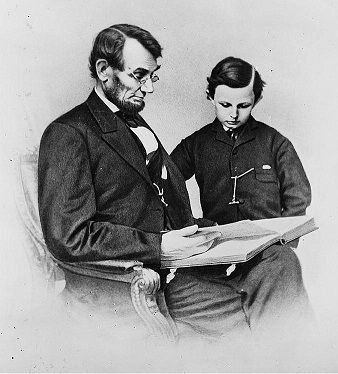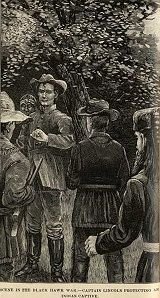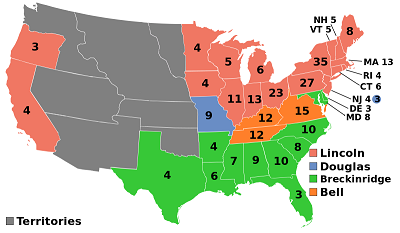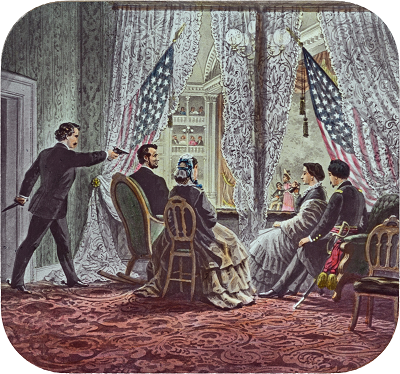
Main Facts
Abraham Lincoln (February 12, 1809 – April 15, 1865) was an American politician and lawyer who served as the 16th President of the United States from March 1861 until his assassination in April 1865. Lincoln led the United States through its Civil War—its bloodiest war and perhaps its greatest moral, constitutional, and political crisis. In doing so, he preserved the Union, paved the way to abolition of slavery, strengthened the federal government, and modernized the economy.

Early Life
Abraham Lincoln was born February 12, 1809, the second child of Thomas and Nancy Hanks Lincoln, in a one-room log cabin on the Sinking Spring Farm near Hodgenville, Kentucky. He was a descendant of Samuel Lincoln, an Englishman who migrated from Hingham, Norfolk to its namesake of Hingham, Massachusetts in 1638.
In 1816, the family moved north across the Ohio River to Indiana, a free, non-slaveholding territory, where they settled in an "unbroken forest" in Hurricane Township, Perry County. The farm is preserved as part of the Lincoln Boyhood National Memorial.
As a youth, Lincoln disliked the hard labor associated with frontier life. Some of his neighbors and family members thought for a time that he was lazy for all his "reading, scribbling, writing, ciphering, writing Poetry, etc.", and must have done it to avoid manual labor. His stepmother also acknowledged he did not enjoy "physical labor", but loved to read. Lincoln was largely self-educated. His formal schooling from several itinerant teachers was intermittent, the aggregate of which may have amounted to less than a year; however, he was an avid reader and retained a lifelong interest in learning.
As he grew into his teens, Lincoln took responsibility for the chores expected of him as one of the boys in the household. He also complied with the customary obligation of a son giving his father all earnings from work done outside the home until the age of twenty-one. Abraham became adept at using an axe. Tall for his age, Lincoln was also strong and athletic.

Marriage and Children
According to some sources, Lincoln's first romantic interest was Ann Rutledge, whom he met when he first moved to New Salem; these sources indicate that by 1835, they were in a relationship but not formally engaged. She died at the age of 22 on August 25, 1835, most likely of typhoid fever. In the early 1830s, he met Mary Owens from Kentucky when she was visiting her sister.
Late in 1836, Lincoln agreed to a match with Mary if she returned to New Salem. Mary did return in November 1836, and Lincoln courted her for a time; however, they both had second thoughts about their relationship. On August 16, 1837, Lincoln wrote Mary a letter suggesting he would not blame her if she ended the relationship. She never replied and the courtship ended.
In 1840, Lincoln became engaged to Mary Todd, who was from a wealthy slave-holding family in Lexington, Kentucky. They met in Springfield, Illinois, in December 1839 and were engaged the following December. A wedding set for January 1, 1841, was canceled when the two broke off their engagement at Lincoln's initiative. They later met again at a party and married on November 4, 1842, in the Springfield mansion of Mary's married sister. While preparing for the nuptials and feeling anxiety again, Lincoln, when asked where he was going, replied, "To hell, I suppose." In 1844, the couple bought a house in Springfield near Lincoln's law office. Mary Todd Lincoln kept house, often with the help of a relative or hired servant girl.
He was an affectionate, though often absent, husband and father of four children. Robert Todd Lincoln was born in 1843 and Edward Baker Lincoln (Eddie) in 1846. Edward died on February 1, 1850, in Springfield, probably of tuberculosis. "Willie" Lincoln was born on December 21, 1850, and died of a fever on February 20, 1862. The Lincolns' fourth son, Thomas "Tad" Lincoln, was born on April 4, 1853, and died of heart failure at the age of 18 on July 16, 1871. Robert was the only child to live to adulthood and have children. The Lincolns' last descendant, great-grandson Robert Todd Lincoln Beckwith, died in 1985. Lincoln "was remarkably fond of children", and the Lincolns were not considered to be strict with their own.
The deaths of their sons had profound effects on both parents. Later in life, Mary struggled with the stresses of losing her husband and sons, and Robert Lincoln committed her temporarily to a mental health asylum in 1875. Abraham Lincoln suffered from "melancholy", a condition which now is referred to as clinical depression.
Lincoln's father-in-law and others of the Todd family were either slave owners or slave traders. Lincoln was close to the Todds, and he and his family occasionally visited the Todd estate in Lexington.
During his term as President of the United States of America, Mary was known to cook for Lincoln often. Since she was raised by a wealthy family, her cooking abilities were simple, but satisfied Lincoln's tastes, which included, particularly, imported oysters.

Early Career and Militia Service
In 1832, at age 23, Lincoln and a partner bought a small general store on credit in New Salem, Illinois. Although the economy was booming in the region, the business struggled and Lincoln eventually sold his share. That March he began his political career with his first campaign for the Illinois General Assembly. He had attained local popularity and could draw crowds as a natural raconteur in New Salem, though he lacked an education, powerful friends, and money, which may be why he lost. He advocated navigational improvements on the Sangamon River.
Before the election, Lincoln served as a captain in the Illinois Militia during the Black Hawk War. Following his return, Lincoln continued his campaign for the August 6 election for the Illinois General Assembly. At 6 feet 4 inches (193 cm), he was tall and "strong enough to intimidate any rival". At his first speech, when he saw a supporter in the crowd being attacked, Lincoln grabbed the assailant by his "neck and the seat of his trousers" and threw him. Lincoln finished eighth out of 13 candidates (the top four were elected), though he received 277 of the 300 votes cast in the New Salem precinct.

1860 election and secession
On November 6, 1860, Lincoln was elected the 16th president of the United States, beating Douglas, Breckinridge, and Bell. He was the first president from the Republican Party. His victory was entirely due to the strength of his support in the North and West; no ballots were cast for him in 10 of the 15 Southern slave states, and he won only two of 996 counties in all the Southern states.
Lincoln received 1,866,452 votes, Douglas 1,376,957 votes, Breckinridge 849,781 votes, and Bell 588,789 votes. Turnout was 82.2 percent, with Lincoln winning the free Northern states, as well as California and Oregon. Douglas won Missouri, and split New Jersey with Lincoln. Bell won Virginia, Tennessee, and Kentucky, and Breckinridge won the rest of the South.
Although Lincoln won only a plurality of the popular vote, his victory in the electoral college was decisive: Lincoln had 180 and his opponents added together had only 123. There were fusion tickets in which all of Lincoln's opponents combined to support the same slate of Electors in New York, New Jersey, and Rhode Island, but even if the anti-Lincoln vote had been combined in every state, Lincoln still would have won a majority in the Electoral College.

Assassination and Funeral
Abraham Lincoln was assassinated by John Wilkes Booth on Good Friday, April 14, 1865, while attending a play at Ford's Theatre as the American Civil War was drawing to a close. The assassination occurred five days after the surrender of Robert E. Lee and the Confederate Army of Northern Virginia. Booth was a well-known actor and a Confederate spy from Maryland; though he never joined the Confederate army, he had contacts with the Confederate secret service. In 1864, Booth formulated a plan (very similar to one of Thomas N. Conrad previously authorized by the Confederacy) to kidnap Lincoln in exchange for the release of Confederate prisoners. After attending an April 11, 1865, speech in which Lincoln promoted voting rights for blacks, an incensed Booth changed his plans and became determined to assassinate the president. Learning that the President and Grant would be attending Ford's Theatre, Booth formulated a plan with co-conspirators to assassinate Lincoln and Grant at the theater, as well as Vice President Johnson and Secretary of State Seward at their homes. Without his main bodyguard, Ward Hill Lamon, Lincoln left to attend the play Our American Cousin on April 14. At the last minute, Grant decided to go to New Jersey to visit his children instead of attending the play.
Lincoln's bodyguard, John Parker, left Ford's Theater during intermission to drink at the saloon next door. The now unguarded President sat in his state box in the balcony. Seizing the opportunity, Booth crept up from behind and at about 10:13 pm, aimed at the back of Lincoln's head and fired at point-blank range, mortally wounding the President. Major Henry Rathbone momentarily grappled with Booth, but Booth stabbed him and escaped.
After being on the run for 12 days, Booth was tracked down and found on a farm in Virginia, some 70 miles (110 km) south of Washington. After refusing to surrender to Union troops, Booth was killed by Sergeant Boston Corbett on April 26.
Doctor Charles Leale, an Army surgeon, found the President unresponsive, barely breathing and with no detectable pulse. Having determined that the President had been shot in the head, and not stabbed in the shoulder as originally thought, he made an attempt to clear the blood clot, after which the President began to breathe more naturally. The dying President was taken across the street to Petersen House. After remaining in a coma for nine hours, Lincoln died at 7:22 am on April 15. Secretary of War Stanton saluted and said, "Now he belongs to the ages."
Lincoln's flag-enfolded body was then escorted in the rain to the White House by bareheaded Union officers, while the city's church bells rang. President Johnson was sworn in at 10:00 am, less than 3 hours after Lincoln's death. The late President lay in state in the East Room, and then in the Capitol Rotunda from April 19 through April 21. For his final journey with his son Willie, both caskets were transported in the executive coach "United States" and for three weeks the Lincoln Special funeral train decorated in black bunting bore Lincoln's remains on a slow circuitous waypoint journey from Washington D.C. to Springfield, Illinois, stopping at many cities across the North for large-scale memorials attended by hundreds of thousands, as well as many people who gathered in informal trackside tributes with bands, bonfires, and hymn singing or silent reverence with hat in hand as the railway procession slowly passed by. Poet Walt Whitman composed When Lilacs Last in the Dooryard Bloom'd to eulogize Lincoln, one of four poems he wrote about the assassinated president. Historians have emphasized the widespread shock and sorrow, but also noted that some Lincoln haters cheered when they heard the news. African-Americans were especially moved; they had lost 'their Moses'. In a larger sense, the outpouring of grief and anguish was in response to the deaths of so many men in the war that had just ended.

I hope you liked another article of the "Most Significant Figures in History". Note, that the number in the title does NOT mean that the one figure had more influence than the other.
Thank you for reading, I hope you liked it. If you did, consider upvoting and following me. :)
This post has received a 21.39 % upvote from @booster thanks to: @elephantas1.